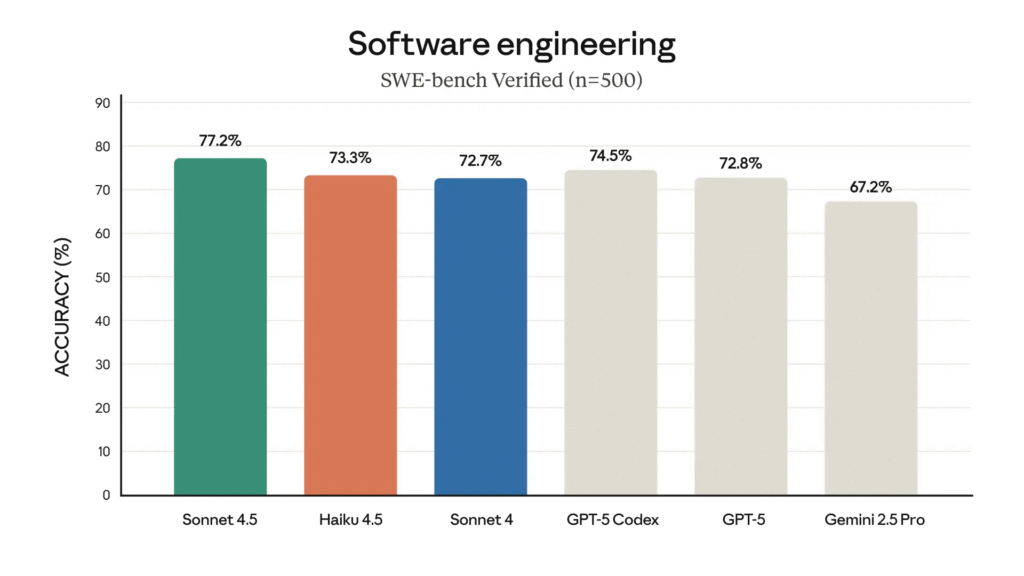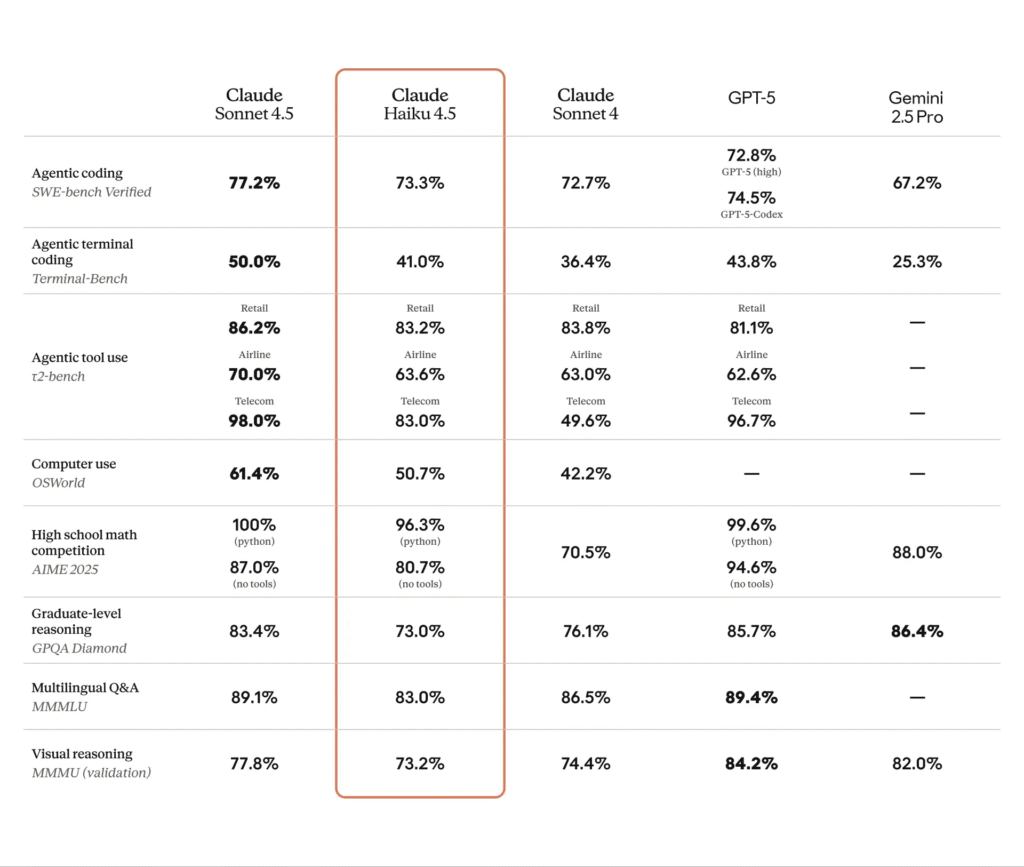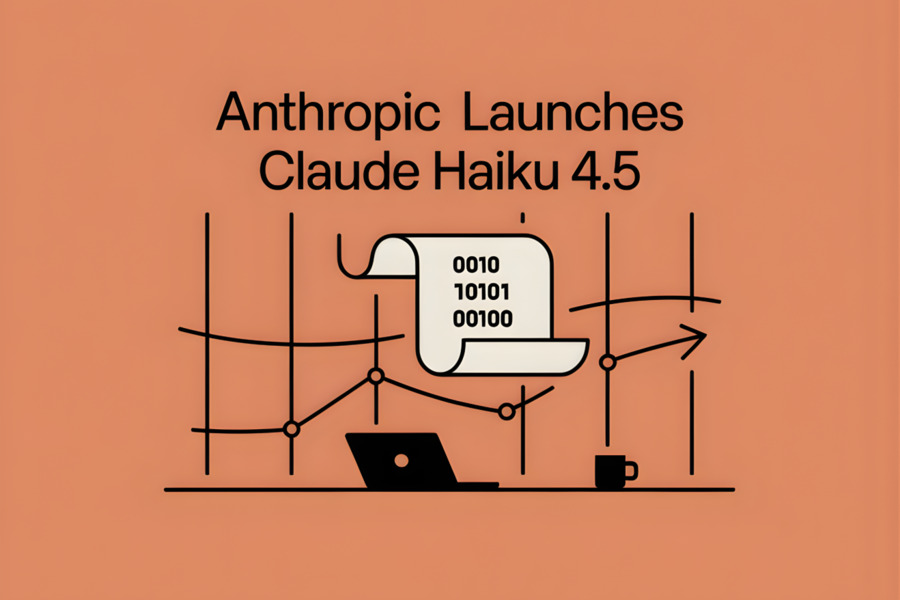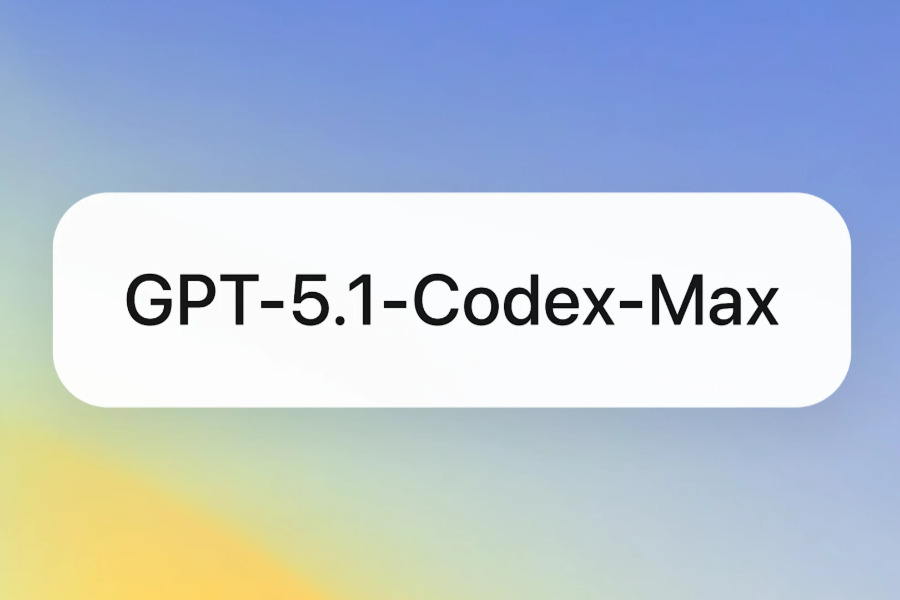Anthropic has officially launched Claude Haiku 4.5, its latest compact AI model that delivers performance comparable to much larger models while operating at significantly higher speeds and lower costs. The release represents a substantial advancement in making powerful AI more accessible and economical for widespread use.
The new model specializes in real-time applications such as responsive chat assistants, customer service systems, and programming aids, positioning itself as an ideal solution for businesses requiring high-performance AI without the typical associated costs.
Perhaps most notably, Haiku 4.5 will become the default model for free Claude plans, dramatically improving the experience for users without paid subscriptions.
What is Claude Haiku 4.5?
Claude Haiku 4.5 is the newest iteration in Anthropic’s family of AI models, which includes three primary tiers: the compact Haiku, mid-sized Sonnet, and flagship Opus. While larger models typically excel in broad knowledge tasks, they demand more computational resources, resulting in slower response times and higher operational costs. Haiku 4.5 utilizes advanced distillation techniques to create a highly optimized, smaller model that maintains impressive capabilities despite its reduced size.
This careful balance of intelligence and processing speed makes Haiku 4.5 particularly well-suited for applications requiring immediate feedback. Its architecture enables it to handle functional tasks like coding and computer operation with proficiency approaching that of larger models, but with dramatically improved efficiency.

The model introduces an innovative multi-model collaborative architecture where the more powerful Sonnet 4.5 handles complex task decomposition, while multiple Haiku 4.5 instances execute subtasks in parallel. This approach significantly enhances efficiency in solving complex problems while reducing overall costs.
Haiku 4.5 Performance in Benchmarks
Industry standard evaluations confirm Haiku 4.5’s substantial capabilities. In the authoritative SWE-bench programming benchmark, the model achieved an impressive 73.3% score, narrowly surpassing Sonnet 4’s 72.7% result. This demonstrates that the compact model can indeed match and sometimes exceed the performance of its larger predecessor in specific tasks.

The performance highlights extend beyond coding capabilities:
- Computer Use: Haiku 4.5 achieved a 50.7% score on OSWorld benchmarks, notably surpassing Sonnet 4’s 42.2% performance. This exceptional capability in simulating human computer operations opens new possibilities for automation.
- Mathematics: With Python tool support, the model reached 96.3%, and even without tools, it maintained a strong 80.7% performance.
- Terminal Coding: The model scored 41.0% in terminal-focused coding tasks, again comparable to Sonnet 4’s 36.4%.
Anthropic emphasizes that Haiku 4.5 operates at “more than twice the speed” of Sonnet 4, making it particularly valuable for applications requiring rapid responses. This speed advantage, combined with its robust performance profile, positions Haiku 4.5 as a compelling alternative to larger models for many practical applications.
Claude Haiku 4.5 Pricing
Perhaps one of the most disruptive aspects of Haiku 4.5 is its aggressive pricing structure, which significantly enhances its market competitiveness. For API access, the model is priced at $1 per million input tokens and $5 per million output tokens.
This represents approximately one-third the cost of Sonnet 4, providing exceptional value for budget-conscious deployments.
The pricing contrast with other models in the Claude family is substantial:
- Sonnet 4.5 is priced at $3/$15 per million I/O tokens
- Opus 4.1 commands a premium at $15/$75 per million I/O tokens
This strategic pricing makes Haiku 4.5 a high-value, cost-effective replacement for both older Haiku iterations and Sonnet 4 models, potentially democratizing access to state-of-the-art AI performance for scaled commercial deployments where cost-per-task is a critical factor.
For non-API users, Haiku 4.5 is immediately available across Anthropic’s native platforms, including free tiers, Claude Code, and official mobile applications. Its enhanced efficiency allows users to complete more tasks within existing usage limits while maintaining premium-model performance quality.
How to Access Claude Haiku 4.5
Claude Haiku 4.5 is available immediately through multiple channels:
- Free Claude Plans: The model now serves as the default for free Anthropic accounts, substantially upgrading the experience for non-paying users.
- Claude API: Developers can directly integrate Haiku 4.5 through Anthropic’s API.
- Cloud Platforms: The model is accessible through Amazon Bedrock and Google Cloud’s Vertex AI.
- Development Tools: Haiku 4.5 is supported in Claude Code and other programming assistance tools.
Across these platforms, Haiku 4.5 functions as a seamless, drop-in replacement for earlier iterations like Haiku 3.5 and Sonnet 4, providing immediate performance and cost benefits without requiring significant infrastructure changes.
Final Words on Claude Haiku 4.5
Beyond its standalone capabilities, Haiku 4.5 introduces innovative collaborative potential through Anthropic’s multi-model architecture. In this framework, the more powerful Sonnet 4.5 acts as a planner that breaks down complex problems into multi-step plans, while multiple Haiku 4.5 instances execute these subtasks concurrently.
This approach resembles a project manager (Sonnet 4.5) coordinating a specialized team (multiple Haiku 4.5 instances), enabling efficient resolution of complex, multi-step problems with dramatically reduced time and cost requirements.
Anthropic believes this paradigm opens new possibilities for advanced agentic applications, particularly in sophisticated fields like large-scale AI-powered coding and financial analysis.



